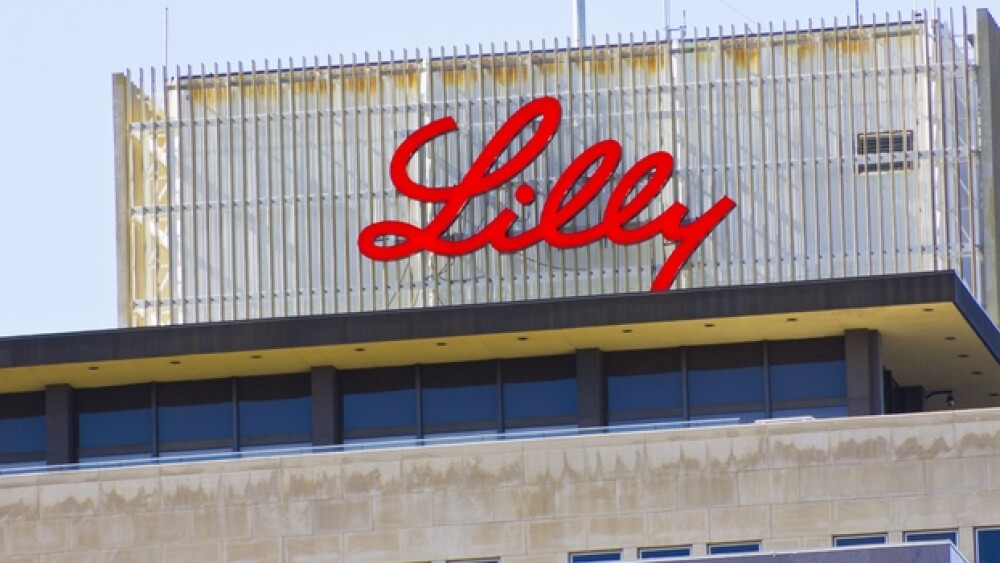In an interview, Lilly’s CSO said the third antibody could possibly begin human trials in the new few weeks. But the statement that got everyone more excited was when he indicated one of the antibodies might be available for use by September.
Jonathan Weiss / Shutterstock
On Monday, Eli Lilly and Company announced that its partner Junshi Biosciences had dosed the first healthy volunteer in a clinical trial of a neutralizing antibody against COVID-19. The company is testing a second antibody to test and is conducting preclinical studies of a third antibody. In an interview with Reuters, the company’s Chief Scientific Officer Daniel Skovronsky said the third antibody could possibly begin human trials in the new few weeks. But the statement that got everyone more excited was when he indicated one of the antibodies might be available for use by September.
“For the treatment indication, particularly, this could go pretty fast,” Skovronsky said. “If in August or September we’re seeing the people who got treated are not progressing to hospitalization, that would be powerful data and could lead to emergency use authorization. So that puts you in the fall time: September, October, November is not unreasonable.”
ad
Monoclonal antibodies are used to treat cancer, rheumatoid arthritis and many other diseases. They are essentially immune cells that have been found to activate against a specific type of cell, whether it’s a specific type of cancer cell or a specific virus, in this case, SARS-CoV-2, the virus that causes COVID-19.
The CoVIg-19 Plasma Alliance has been joined by a number of companies, including Biotest, BPL, CSL Behring, LFB, Octapharma and Takeda, to accelerate development of a plasma-derived hyperimmune globulin therapy against COVID-19. It is also collaborating with the U.S. National Institute of Allergy and Infectious Diseases (NIAID) to evaluate the safety, tolerability and efficacy of the hyperimmune therapy in adults with COVID-19.
Sorrento Therapeutics is also working on a therapeutic antibody. It has partnered with New York City-based Mount Sinai Health System to develop an antibody cocktail called COVI-SHIELD to treat COVID-19, and indicated that one of its antibodies, STI-1499, has shown 100% inhibition of SARS-CoV-2 in laboratory tests.
One advantage of the antibody approach is they are generally faster than the development of a vaccine. Even though vaccine development for COVID-19 is moving at an unprecedented pace, many things need to go perfectly for one to be available before the end of the year that is both safe and effective, and many experts question the likelihood of that happening.
Lilly’s two antibodies are LY-COV555, which is being developed with Canadian biotech company AbCellera. The second, JS016, is partnered with Chinese company Shanghai Junshi Biosciences. Both act by blocking the virus’ spike (S) protein that it uses to enter human cells.
Skovronsky indicated that the third possible antibody candidate acts on a different part of the virus, and most likely will be tested with one or both of the other candidates.
“It’s good to have two antibodies,” Skovronsky said. “The downside is that manufacturing is precious. We have limited manufacturing capacity. If two antibodies are required, half as many people will get treated. So our goal is to see if we can do one antibody at as low a dose as possible.”
If one of the antibodies is effective, the company has the manufacturing capacity to deliver hundreds of thousands of doses by the end of the year. However, the capacity isn’t enough for global distribution.
Skovronsky said, “Global capacity for antibodies is just not high enough that we could ever think about adequate doses” for “billions of people in the prophylactic setting.”
He goes on to suggest that the best solution would be to widely inoculate individuals with COVID-19 vaccines when they become available and hold back antibody treatments for people who either have the disease or have recently been exposed to it. This, in particular, could help with vulnerable populations, such as nursing homes, where vaccines are less effective. Vaccines depend on the immune system being able to build an adequate response to the vaccine, which will then be able to mount a defense against the actual virus. The elderly and immuno-compromised may not always build enough response to the vaccine to provide effective defense.
Lilly indicates it plans to manufacture the antibodies in facilities in Kinsale, Ireland and New Jersey. It is also willing to work out manufacturing deals with other company’s antibody treatments if their own clinical trials fail.
Meanwhile, Lilly is continuing to search for antibodies via a partnership with AbCellera, which is working with the U.S. National Institutes of Health to identify promising compounds.





